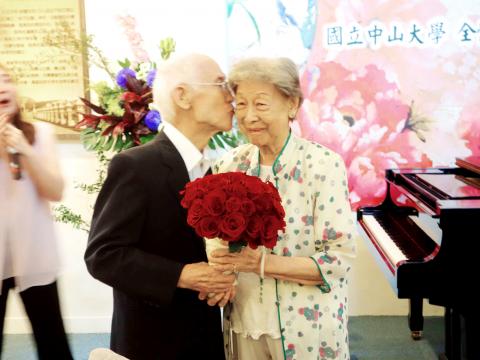Noted poet and essayist Yu Kwang-chung (余光中) yesterday died from complications from pneumonia at age 90, Kaohsiung Medical University Chung-ho Memorial Hospital said.
Yu was hospitalized last week after a suspected mini-stroke, before being transferred to the intensive care unit because of pneumonia, the hospital said, adding that detailed information has been withheld out of respect for Yu’s family.
Yu had been in poor health since last year, when he was twice hospitalized, first for an intestinal complaint and then a fall.

Photo courtesy of National Sun Yat-sen University
He celebrated his 60th wedding anniversary last year by donating to charity.
National Sun Yat-sen University, where Yu was a professor emeritus of literature, said the poet made his last public appearance at his birthday party in October.
One of the last classes Yu taught before he retired from active teaching was a humanities seminar, the university said.
Director Ang Lee (李安) and Chinese writer Wang Anyi (王安憶) gave talks at the seminar and Yu was well enough to give lectures, the university said.
Born in Nanjing, China, in 1928, Yu began writing in 1949 while attending Xiamen University.
Fleeing the Chinese Civil War, he migrated to Taiwan in 1950. He gained renown for his literary talent and proficiency after publishing a half-dozen well-received poems, seven critical essays and two translations in a 10-day period in May that year.
Yu wrote poetry, songs, literary critiques and translations. Several of his works, such as Homesickness (鄉愁), My Four Hypothetical Enemies (我的四個假想敵) and Listen to the Cold Rain (聽聽那冷雨), are taught as standard Chinese literature in Taiwan and China.
Yu won a National Culture and Arts Award for new poetry in 1989, and in 2014, the Ministry of Culture awarded him the Cultural Award.
“We must aspire to gather Chinese words into a great philharmonic through the verisimilitude of syntax. The author’s pen should, as the symphony conductor’s baton, blend the hundreds of notes into music,” Yu said in his Cultural Award acceptance speech.
“Yu writes poems with his right and prose with his left. His achievements are peerless,” essayist and Shakespeare translator Liang Shih-chiu (梁實秋) once said of Yu.
Politically, Yu was regarded as a staunch proponent of Chinese nationalism and had on multiple occasions spoken out against of Taiwanese independence.

DAREDEVIL: Honnold said it had always been a dream of his to climb Taipei 101, while a Netflix producer said the skyscraper was ‘a real icon of this country’ US climber Alex Honnold yesterday took on Taiwan’s tallest building, becoming the first person to scale Taipei 101 without a rope, harness or safety net. Hundreds of spectators gathered at the base of the 101-story skyscraper to watch Honnold, 40, embark on his daredevil feat, which was also broadcast live on Netflix. Dressed in a red T-shirt and yellow custom-made climbing shoes, Honnold swiftly moved up the southeast face of the glass and steel building. At one point, he stepped onto a platform midway up to wave down at fans and onlookers who were taking photos. People watching from inside

A Vietnamese migrant worker yesterday won NT$12 million (US$379,627) on a Lunar New Year scratch card in Kaohsiung as part of Taiwan Lottery Co’s (台灣彩券) “NT$12 Million Grand Fortune” (1200萬大吉利) game. The man was the first top-prize winner of the new game launched on Jan. 6 to mark the Lunar New Year. Three Vietnamese migrant workers visited a Taiwan Lottery shop on Xinyue Street in Kaohsiung’s Gangshan District (崗山), a store representative said. The player bought multiple tickets and, after winning nothing, held the final lottery ticket in one hand and rubbed the store’s statue of the Maitreya Buddha’s belly with the other,

Japan’s strategic alliance with the US would collapse if Tokyo were to turn away from a conflict in Taiwan, Japanese Prime Minister Sanae Takaichi said yesterday, but distanced herself from previous comments that suggested a possible military response in such an event. Takaichi expressed her latest views on a nationally broadcast TV program late on Monday, where an opposition party leader criticized her for igniting tensions with China with the earlier remarks. Ties between Japan and China have sunk to the worst level in years after Takaichi said in November that a hypothetical Chinese attack on Taiwan could bring about a Japanese

‘COMMITTED TO DETERRENCE’: Washington would stand by its allies, but it can only help as much as countries help themselves, Raymond Greene said The US is committed to deterrence in the first island chain, but it should not bear the burden alone, as “freedom is not free,” American Institute in Taiwan Director Raymond Greene said in a speech at the Institute for National Defense and Security Research’s “Strengthening Resilience: Defense as the Engine of Development” seminar in Taipei yesterday. In the speech, titled “Investing Together and a Secure and Prosperous Future,” Greene highlighted the contributions of US President Donald Trump’s administration to Taiwan’s defense efforts, including the establishment of supply chains for drones and autonomous systems, offers of security assistance and the expansion of